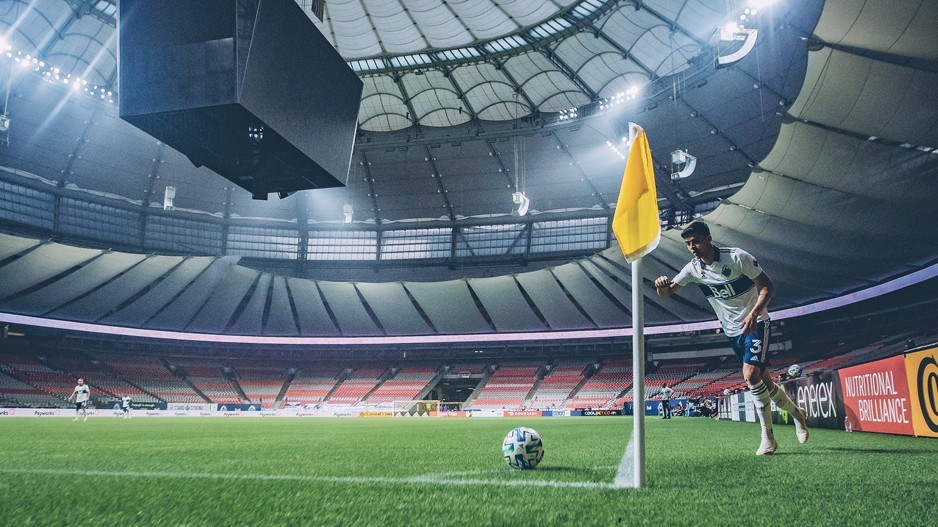The Major Soccer League (MLS) this month launched its schedule and new online format for eMLS – a competition played by some of the top Electronic Arts FIFA players in the world.
The 2021 season, which features representatives from the league’s 27 teams, promises to be the biggest and best season yet, according to MLS.
The same cannot be said for the upcoming seasons of conventional sports.
“We are still facing a lot of problems,” said Axel Schuster, CEO and sporting director of the Vancouver Whitecaps FC, which, unlike many other organizations in the world of sports and entertainment, didn’t lay off or cut the salaries of any of its employees during the pandemic.
“We are staying optimistic, but we also are not naive,” he said. “It is our responsibility to look at every possible scenario.”
It remains uncertain when or where the Whitecaps will play games this year.
The “worst, worst case scenario,” according to Schuster, would involve not being able to play in the United States.
“[That] would have such a huge economic impact to our organization,” he said, adding that that in turn would potentially have an effect on the developing club’s structure.
The uncertainty surrounding the upcoming seasons of professional sports leagues, and the persistence of strict health guidelines, creates uncertainty about the sports and entertainment industry’s timeline for recovery.
National Hockey League (NHL) commissioner Gary Bettman noted last week that individual clubs and the league are going to lose a lot of money to play a shorter 2021 season, and that it would have been cheaper to shut the NHL down. While the province will allow games to be played in B.C., fan attendance at any professional game remains restricted.
It’s still not known when fans will be allowed to attend a BC Lions game, club president Rick LeLacheur told BIV.
“I expect for 2021 that we will be playing in front of a limited number of fans throughout the year, if not the whole year, depending on how the vaccines go.”
LeLacheur added that there is a chance the Canadian Football League team will play in front a full audience at the end of the season.
BC Place, which hosts BC Lions and Whitecaps games, is closely following B.C.’s recovery plan.
“Given that we are at the start of potentially a widespread vaccine program, that gives us hope that we are heading towards Phase 4 of B.C.’s restart plan, which gives us opportunities for resuming the type of spectator events that we’re traditionally used to hosting, and welcoming international tourism as well,” said Duncan Blomfield, marketing and communications manager for BC Place.
Because of COVID-19, BC Place became the first stadium in Canada to achieve Global Biorisk Advisory Council Star accreditation, which means the venue has an internationally recognized program in place for minimizing risks associated with infectious diseases.
Blomfield said the stadium is also looking into new technologies that can be implemented when B.C. moves to its fourth restart phase: cashless payment options, different ticketing technology and new food and beverage ordering and delivery systems to reduce lineups and contact between customers.
Alvarol Prol, owner of This is Blueprint, hopes that government regulations will begin to ease by late summer, and that by 2021’s fourth quarter, his business, which hosts some of the biggest music festivals in Western Canada, will be operating at 80%.
“I tell people all the time: I think people are going to be crying at some of these larger events and festivals when they actually just feel the energy of being around all these other human beings after everyone’s been separated for so long,” he said.
According to two U.S.-focused industry outlooks by the Deloitte Center for Technology, Media & Telecommunications, entertainment organizations can position themselves to thrive beyond the pandemic by focusing on customer needs and remixing entertainment offerings, while sports organizations can take advantage of digital tools to drive new models of revenue generation, and by exploring new ways to foster year-round fan engagement.
Schuster said the MLS will be able to find ways to get the league started up again in 2021.
“We should not make our problems bigger than they are. There are much bigger problems in the world. There are people that got impacted by this virus. We will be able to go on without this next year.” •
Editor’s note: This is the first story of Part 2 in BIV’s series on the late-pandemic state of B.C.’s economy, and what each sector seeks as a prescription for recovery in the coming months. See biv.com over the next week for more in the series.




